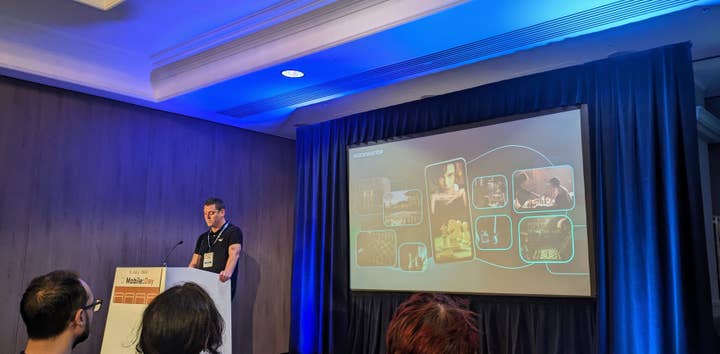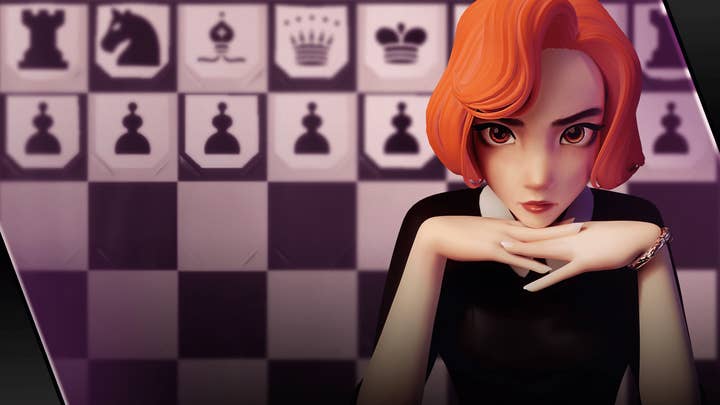"I just dropped them an email" – How a small studio won over Netflix to make a Queen's Gambit game
Jamie Brayshaw on pitching boldly, identifying pain points for a strong concept, and designing for first-time players
At Develop Brighton last week, Jamie Brayshaw, Ripstone's head of partnerships, gave a talk on how the studio convinced Netflix to let them develop a Queen's Gambit title – the developer's first mobile project, and the first Netflix game using Unreal Engine.
While the Liverpool-based developer had experience making chess games (it is behind 2017's Chess Ultra), The Queen's Gambit's existence is the result of a bullish strategy from the studio. Brayshaw took the audience through that journey, from an extremely short pitching deadline to the challenges of making a mobile game in Unreal.
"Before we made The Queen's Gambit, we had a lot of experience making games using Unreal," Brayshaw explained. "And we made mobile games in the past, mainly using proprietary tech, custom engines. But this was our first game using Unreal for mobile."
Brayshaw went through the highs and lows of the development journey, Ripstone's partnership with Netflix, and demonstrated how being bold at the pitching stage – even if you're a small studio – can pay off.
A bold gambit
You may remember that at some point in the whirlwind that was 2020, people got really into playing games, whether digital or analog, including chess. Brayshaw noted this was a good time for Rockwater, the Ripstone studio that made Chess Ultra for PC and console, as a lot of players picked up the game.
Fast forward to October 2020, and Netflix released its adaptation of The Queen's Gambit, a miniseries following the rise of (fictional) chess prodigy Beth Harmon during the Cold War era.
"It sparked a moment in popular culture," Brayshaw recalled, with 62 million people watching The Queen's Gambit within a month. "It put chess front and centre of people's imagination. Popularity went wild, chess sets sold out around the world.
"My open gambit was: lots of platforms say 'We are the Netflix of games', but what about you? You're actually Netflix, when are you going to be the Netflix of games?"
"Loads of people picked up Chess Ultra, and we wondered how we could make the most of this moment to connect with the fans. How can we bring The Queen's Gambit and our games together?"
Rockwater did not waste time, and Brayshaw simply… emailed Netflix. He told them about the studio's expertise, asked to set up a call so they could pitch some concepts. This included ideas for community tournaments, DLC, a VR game, and more.
"And then on the call, I'm fully prepared to present, and right at the beginning ask a simple question that took us down a very different path. My open gambit was: lots of platforms say 'We are the Netflix of games', but what about you? You're actually Netflix, when are you going to be the Netflix of games? And to our surprise, our timing was absolutely perfect."
The meeting very quickly got sidetracked as Netflix was actually preparing its foray into the games industry at the time, gearing up to show its strategy to select partners.
"So, being a little bit pushy as I can be, I said: can we see it?," Brayshaw smiled. "We got a preview and, at the end of it, with our jaws on the floor, I [tell] them that I actually don't think it's worth us pitching the ideas that we've got, [because] it doesn't fit with what you just presented... Instead I think we could make a beautiful game, in your world, for mobile devices. And they said: 'Great, we'd love to hear a pitch for that: you've got a week'."

A lot of questions to answer
A week is nothing in game development time so, while the opportunity was huge, figuring out a solid game idea in such a short time frame was challenging.
"When everybody's heads stopped spinning, we got started on concepts and the first thought was [to] bring the best of both of our worlds together," Brayshaw recalled.
The team wanted to take everything that Rockwater's chess games were renowned for ("Kotaku once kindly referred to Chess Ultra as the Gran Turismo of chess," Brayshaw laughed) combined with what makes the Queen's Gambit special.
"The locations, the charming characters, the sense of place that it gave to chess, and the joy of learning and playing chess with Beth Harmon…," Brayshaw listed. "Let's bring all that together and make a love letter to The Queen's Gambit. Fantastic starting point. But hang on. This is a mobile game, and it's for a brand new audience on Netflix... It can't just be the Gran Turismo of chess but in your pocket. And can we even use Unreal, that we've been using on Chess Ultra, for a game that's on mobile?"
A neverending list of questions and challenges appeared to the team. From a design standpoint, they wondered how to capture the appeal of learning and playing chess, and connect with new audiences on mobile.
"What does it mean to be a Netflix game? How many people will be brand new to games because they are discovering games through Netflix? And from our point of view, can we achieve console quality? Can we do that on mobile? How?
"From a tech point of view, we all know that Unreal is a Swiss army knife for development. But it's a Swiss army knife the size of a skyscraper, and we're trying to achieve this on mobile. How will the game run? What will we have to compromise? And then working with Netflix on the IP. What do we need to be mindful of? What are the limitations?"
Design-wise, Brayshaw said the studio started "as all games do," with a lot of ideas and assumptions about the audience. Rockwater's bread and butter is "authentic chess experiences," he continued, and they knew they also wanted to bring the characters of the show to life.
"And they said: 'Great, we'd love to hear a pitch for that: you've got a week'."
"But what we felt everybody loved most in the show is Beth Harmon. Her super powerful chess, and how she uses it to embody power and control in a difficult world, is what everybody fell in love with. How can we incorporate that? What would it be like to learn and play chess if you had her gifts?
"What would it feel like overall to go on her journey from an inspired beginner and curious about chess in the basement of an orphanage, to be a Grandmaster capable of being the reigning world champion in Moscow?"
But the team also quickly realised that the game could not just be chess. Brayshaw mentioned that it takes most people about half an hour to finish a chess game, often more if you're new to it.
"Chess is complex, intimidating, and long," he added. "So to connect with fans and deliver something exceptional on mobile, we needed to make sure it [had] more to offer. Lots of puzzles, brain training games, and things that make it more accessible, more immediate, more bite size.
"To use all the mobile clichés: to be able to play on the toilet, or play in the queue for a coffee. If you think chess down to its core essence, it's about finding the next best move. It's about solving little little problems, which feels super satisfying to do. So we built this into the game, we built it around puzzles. Even if you're not good enough to play and win a full game of chess, you can still feel good, powerful and have fun with it."
Another difficulty was to be able to cater to a lot of different audiences; intermediate and advanced chess players, but also "inspired beginners," people who watched the show but didn't know much about chess, as well as fans of the show who wanted more. And of course, due to the fact it's a Netflix title, people new to gaming altogether.
A wealth of lessons
The Queen's Gambit Chess (the name of Rockwater's game) successfully released last year, with Brayshaw saying that the way they managed to bring all of these challenges into focus was primarily thanks to user testing.
"Lots and lots of user testing," he smiled. "We started small scale in the studio, using friends, family, and people on the dev team, and then worked with [external] partners. Netflix got these testing facilities as well, as the development rolled on. We found that a lot of our assumptions were right, to blend the bite-sized puzzles and chess.
"[It] was engaging to all audiences. It was fun to play. The formula was good. But we also learnt some lessons pretty quickly that we want to pay forward. Firstly there was way too much friction in the UI between the puzzles. There were three screen touches, which took about a second and a half, which is a hell of a long time in the world of mobile. Way too much friction."
He also mentioned the difficulty to handle mobile devices heating up quickly and how to make sure the game wouldn't be too energy consuming, as well as catering for different display resolutions, and making sure to always design with the lowest end device in mind.
"[But] by far, the biggest learning was the first time user experience," he said. "The golden first hour is where people fall in love with the game. And we all, as developers, rightfully put a lot of care and attention into designing good first-time experiences, the 'welcome to Disneyland' moment. You've arrived, you feel good, there's rich tutorials, and new areas. And originally that was our approach in this game, too. Until we user tested and found that nobody wants a beautiful video, and actually we got three minutes to capture their attention and hook them into the game."
A lot of players bounce within the first three minutes of a mobile game, Brayshaw explained, so it's important to onboard players through gameplay and "get to the good stuff" as fast as possible.
"It was really fascinating for us to think about people who had never played games before, and exciting to be able to design for them"
"We needed to keep it interactive, but strip out anything that was extraneous. None of the videos. All about gameplay, [move] as quick as possible between each of the initial puzzles. That was a big one for us. And when we got it right, about halfway through development, it made all of the rest of the user testing flow much more successfully.
"So I'd actually advise against the old school 'We'll figure out how to get people into this game when we've made the rest of the game.' Don't do that. We've saved a hell of a lot of time once we've figured that out about halfway through and it made all of the following user tests much more successful. And then when the game is live, you'll obviously get a lot more data, to be able to monitor and adapt to your players."
The first-time user experience was updated several times even since the game came out last July, with Rockwater making sure they could easily onboard people who have never played a game before.
"We made sure that we user tested for that cohort as well, which is quite easy through friends and family. That meant that we could understand that simple things like ‘how to move a camera’, or ‘where to press on a UI’, became clear pain points for the users so we could design those out quite smoothly.
"It was really fascinating for us to think about people who had never played games before, and exciting to be able to design for them."

